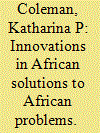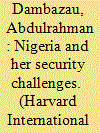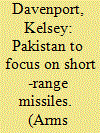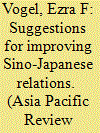|
|
|
Sort Order |
|
|
|
Items / Page
|
|
|
|
|
|
|
| Srl | Item |
| 1 |
ID:
108605


|
|
|
|
|
| Publication |
2011.
|
| Summary/Abstract |
Three critical trends in the evolving practice of regional peacekeeping in sub-Saharan Africa have undermined the usefulness of the common conceptual dichotomy between regional peacekeeping and UN/global peacekeeping. First, sub-Saharan African states have distanced themselves from long-term autonomous regional peacekeeping, and currently favour explicitly interim missions that are a prelude rather than an alternative to UN peacekeeping. Second, the analytically clear line between regional peacekeeping and the separate sub-Saharan African tradition of solidarity deployments (i.e. military support of embattled governments) has in practice become blurred, and the regional vs global peacekeeping dichotomy not only fails to acknowledge this trend but helps to obscure it. Finally, sub-Saharan African states are increasingly addressing regional conflicts by participating in UN operations deployed in the region. UN peacekeeping has thus emerged as a preferred form of regional peacekeeping in sub-Saharan Africa.
|
|
|
|
|
|
|
|
|
|
|
|
|
|
|
|
| 2 |
ID:
132546


|
|
|
|
|
| Publication |
2014.
|
| Summary/Abstract |
Nigeria's importance to global security hinges on the fact she is not only the most populous country in Africa, but also strategically located in a region (Gulf of Guinea) that is a major source of the world's oil. From the 1960 Congo crisis when Nigeria began contributing troops for international peacekeeping, the country has maintained consistency as a key player in both the United Nations and regional peacekeeping missions, thus contributing to world peace. However, Nigeria is currently facing serious internal security challenges, the most serious ones being the Boko Haram insurgency in the northeastern states of Borno, Yobe and Adamawa; and the Niger Delta militancy and piracy in the south-south geopolitical zone, comprising Bayelsa, Delta and Rivers. Additionally, there are security challenges posed by violent crimes, ethno-religious conflicts, resource-based conflicts, trans-border criminal activities, and election-induced violence. All these security challenges undoubtedly pose some threats to the social, economic and political stability of not only Nigeria, but also of the African continent, especially the West African sub-region, where more than half the population comes from Nigeria. While several factors could have contributed to Nigeria's security situation today, there is no doubt that poor governance and lack of effective leadership at all levels of governance are central in attempting to explain the problem. About fourteen years after the return of democracy in 1999, Nigeria's democratic transition does not appear to be consolidating due to lack of transparency, accountability, rule of law, and the genuine demonstration of leadership capacity to protect fundamental human rights. It is also evident that most of the key government institutions are weak, enabling corruption to thrive with impunity. This article examines the current security situation in Nigeria; the several factors contributing to it; and suggests that through effective leadership and good governance the situation could be remedied in order to arrest the apparent slide into state fragility and failure.
|
|
|
|
|
|
|
|
|
|
|
|
|
|
|
|
| 3 |
ID:
128085


|
|
|
|
|
| Publication |
2013.
|
| Summary/Abstract |
Pakistan is likely to remain focused on developing and improving short-range ballistic missiles and cruise missiles to deter India's conventional military superiority despite the second successful test of India's long-range, nuclear-capable Agni-5 missile, experts said in recent interviews.
Although India and Pakistan are nuclear rivals, New Delhi's forays into longer-range missile systems do not seem to be spurring reciprocal developments in Islamabad.
|
|
|
|
|
|
|
|
|
|
|
|
|
|
|
|
| 4 |
ID:
128263


|
|
|
|
|
| Publication |
2013.
|
| Summary/Abstract |
Japan should avoid actions China considers provocative. Japanese top leaders should not visit Yasukuni Shrine and should reaffirm Japan's apologies for tragedies caused by their invasions.
China should not use armed pressure in an effort to determine the sovereignty of territories claimed by Japan and should reaffirm its determination to prevent demonstrations against Japanese.
Chinese and Japanese representatives should seek a formula so both sides could with honor back down from confrontations over territorial disputes such as the Senkaku/Diaoyudao Islands, and affirm their determination to resolve these issues peacefully at a later time.
Both sides should select a small number of high level leaders likely to play an important role in their government for many years ahead. These leaders, representing their respective countries, should meet frequently for comprehensive discussions on a broad range of issues to strengthen mutual understanding and cooperation. Japan should select leaders representing major political parties so that whichever political party is in power policies could continue without interruption.
|
|
|
|
|
|
|
|
|
|
|
|
|
|
|
|
|
|
|
|
|